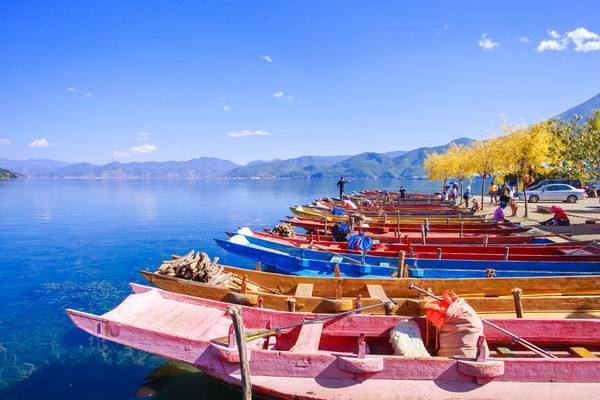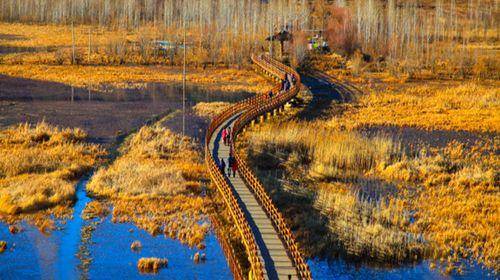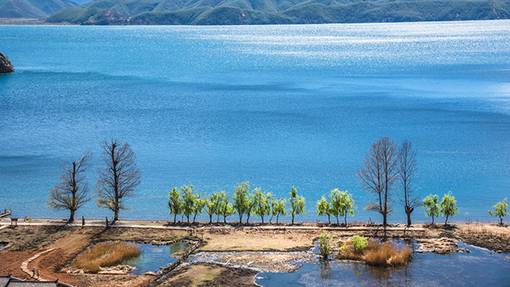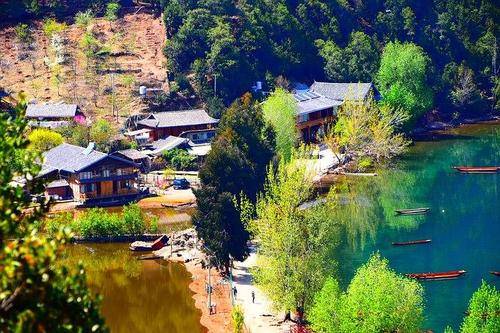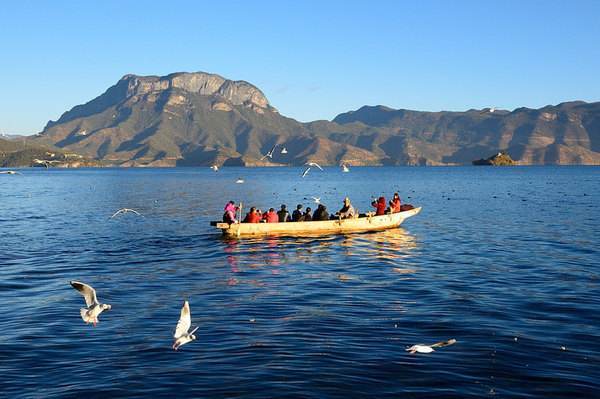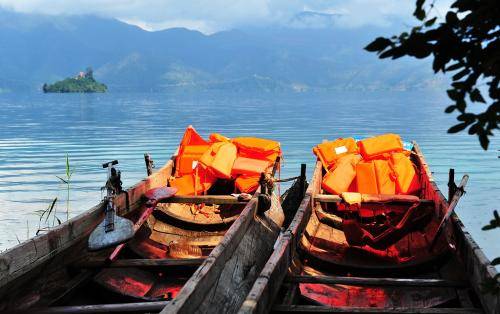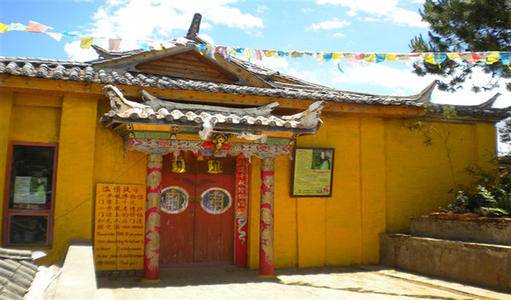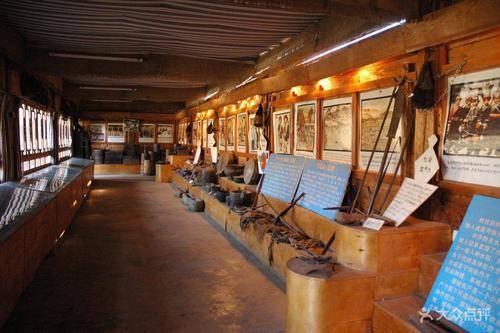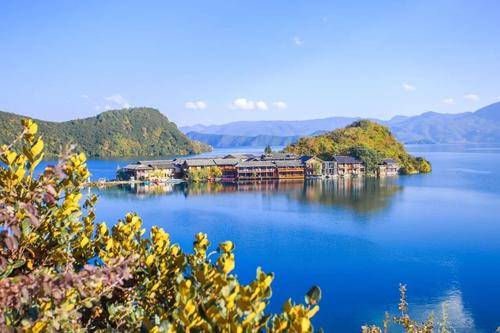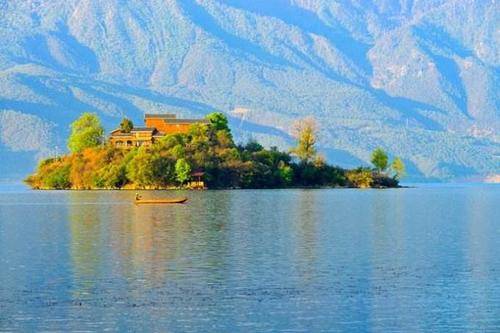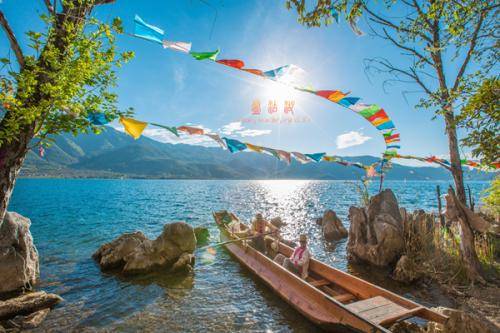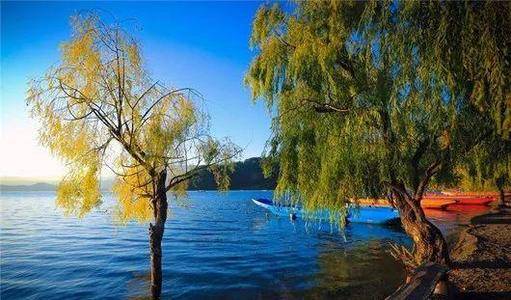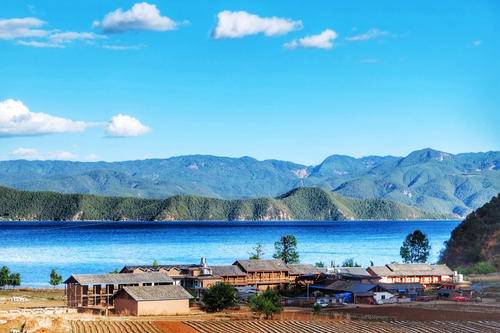Zouhun Bridge
The most famous attraction in Caohai is the Zouhun Bridge, known as the 'First Magpie Bridge under Heaven.' It is a 300-meter-long wooden bridge extending through the reeds of Caohai. The original bridge, which was nearly a hundred years old, had parts of its wood rotted or damaged, scattered in Caohai. The current bridge, adjacent to the old one, was rebuilt later. The Zouhun Bridge spans Caohai, passes through the reeds, and reaches the villages on both sides, providing a convenient passage for villagers and 'Axia' who practice 'walking marriage.' The Zouhun Bridge is a place where Mosuo men and women meet. The Mosuo people by Lugu Lake follow the 'walking marriage' custom, where 'men do not marry, and women do not wed.'
Lovers' Beach
Lugu Lake has two Lovers' Beaches: Libai Lovers' Beach in the Sichuan section and Luoshui Lovers' Beach in the Yunnan section. This beach is located in Liangshan, Sichuan. The trees along the lakeside grow in pairs, standing together like inseparable lovers, which is how the name Lovers' Beach came about. The local residents hang prayer flags in the pine forests and meadows, fluttering in the wind, giving a sense of mystery. With sunshine, a ten-mile sandy shore, and weeping willows, the environment is beautiful. At dusk, couples walk hand in hand, showcasing their tenderness.
Goddess Bay (Zhao Family Bay)
Goddess Bay is a quiet bay in Lugu Lake, named so because it faces Gemu Goddess Mountain, hence also called Goddess Bay. It is said that many Han people with the surname Zhao live here, so it is also called Zhao Family Bay. Goddess Bay offers the best view of the sunset and evening glow over Lugu Lake, and it is one of the most beautiful spots in Lugu Lake.
Gemu Goddess Mountain
Gemu Goddess Mountain, also known as Lion Mountain, has an altitude of 3754.7 meters and is the highest peak around Lugu Lake. In the Mosuo language, Lion Mountain is called 'Gemu,' which means white goddess. According to Mosuo legend, it is the incarnation of the Gemu Goddess. The mountain is majestic and spectacular, towering into the sky. During the Zhuanshan Festival, the Mosuo people climb the mountain to worship the goddess. On the mountain, you can also explore caves, ride the thrilling downhill slide, and capture panoramic views of Lugu Lake.
Zhu Cao Boat
The Zhu Cao Boat, also known as a dugout canoe, is called 'Ri Gu' in the Mosuo language. It has always been the only means of transportation on the lake. It is named after its shape, which resembles a long pig trough. Nowadays, with the emphasis on ecological protection and the prohibition of deforestation, the original Zhu Cao Boats are becoming increasingly rare. Some boats are even equipped with propellers. When you visit Lugu Lake, this is still a must-try activity. The local people are good at singing and dancing, and while you enjoy rowing, they will perform a few songs for you, making you feel relaxed and unwilling to return to the big city. Each village by the lake has its own dock.
Yang Erche Namu Museum
Yang Erche Namu made Lugu Lake, the Mosuo people, and the practice of walking marriage known to the world. To commend and reward her contributions to the development of tourism in Lugu Lake, the Yunnan government granted her a prime piece of land. She invested her own money and spent four years building this private museum. The entrance fee was 30 yuan per person. Unfortunately, a fire occurred in 2015, and it is no longer open for visits.
Located in Boshu Village, Lugu Lake Town, Sichuan, next to the site of the original Mosuo Tusi Mansion, it is the only museum in China and the world that systematically showcases Mosuo history, culture, and folk customs.
Lige Peninsula, with its excellent geographical location, is backed by a sacred mountain and surrounded by water on three sides. Many of the well-known photos of Lugu Lake on various platforms come from here. I personally love this place very much. Sitting at an inn on the peninsula, brewing a pot of Pu'er tea, lying back comfortably, watching the clouds roll by, the shimmering lake surface, and the boats passing by, it's so pleasant!
Luowa Peninsula
This is a very important boundary line, with the famous Caohai on one side and Lianghai on the other. It is also an excellent spot to watch the sunset and sunrise. Every morning, the Mosuo people collect pigweed on the lake, which is also a beautiful sight.
Princess Island
Princess Island, originally named Bowao Island or Bo'ao Island, is the 'Tusi Princess Mansion' commemorating the last princess of Lugu Lake, Xiao Shuming. The scenery here is naturally very beautiful. The visibility of the lake water is particularly high, and the water caltrop grows exceptionally well, with roots and stems often reaching two to three meters long.
Liwu Bi Island
Liwu Bi Island, located in the south-central part of Lugu Lake, is the most famous island in Lugu Lake. There is also a Lama Temple on the island, which houses statues of Sakyamuni, Thousand-Hand Guanyin, and other Buddhist figures. The temple is very popular, and during Tibetan and Buddhist festivals, locals come to pray and worship.
Hei Wa E Island, also known as Xi Wa E Island, is called Snake Island by locals because of the numerous snakes that come out to sunbathe after summer rains. Located in the center of the lake, it is also known as the Heart of the Lake Island. The island is lush with trees and is a haven for various birds, making it a resting place for migratory birds and wild ducks traveling north and south. It was also the water palace of Ayunshan, the chief of the Yongning Tusi in the past. He hosted American botanist Dr. Rock, and they became good friends. Dr. Rock lived on the island for a full eight years and had a very good relationship with the Mosuo people. The Mosuo people have deep affection for this late foreign friend, and many refer to the island as 'Rock Island'.
Several large villages in the area are located by the lake, making dining, accommodation, and boating quite convenient.
